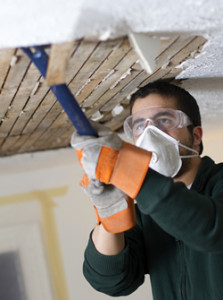Tips For Avoiding Water Damage During Spring Melt

In many states, especially ones that experience a tough winter, water damage is the top cause of home damage and in many cases it can be hard to fix and very costly.
As the weather warms up and the snow starts to melt, the odds of water damage to your home rises dramatically. In many states, especially ones that experience a tough winter, water damage is the top cause of home damage and in many cases it can be hard to fix and very costly.
While it is impossible to prevent all types of water damage, being aware of common spring melt problems can help you prepare your home for the coming runoff and hopefully avoid costly and time-consuming repairs.
While your homeowners insurance can help protect you from many types of water damage, there are some, flooding for example, that are not covered by a standard homeowners policy. It is important to read and fully understand your homeowner’s coverage as it relates to water damage.
If you live in a flood prone area, adding flood coverage is key to making sure your home is fully protected and in most cases your mortgage holder will require you carry a flood policy. While flood insurance is often quite expensive, it can be a real lifesaver if the spring thaw floods your home.
Here are a few things to look for as the weather warms up:
Roof
Ice dams are one of the most common causes of water damage. Ice dams are created when the snow melts off the top of your roof and freezes again at the bottom half creating a wall of ice. Water has nowhere to go when it hits the ice dam and pushes under the shingles and into your home. The water can damage your walls, ceiling, electrical and even the insulation.
Look for icicles on the edge of your roof, this is a key indicator of ice dams. If you suspect you have an ice dam, have an expert come out and remove it before spring melting causes serious damage to your home.
Tips for keeping your attic watertight:
- A properly insulated attic can help prevent ice dams.
- Have your attic professionally inspected for heat leaks.
- Clear vents and chimneys to ensure proper air circulation.
- Repair missing, cracked or damage shingles.
- Inspect your roof twice a year, once in the spring and once in the fall.
Home Foundation
Your foundation is key to making sure your basement stays dry. You should do a foundation inspection twice a year and right before the spring thaw is a great way to find potential issues before the water starts running.
What to look for:
- Walkways, sidewalks and patios should slope away from the basement walls to ensure proper drainage.
- Have any cracks in the foundation filled immediately.
- Clear debris away from basement window wells and downspouts, make sure downspouts are pointed away from the house and drain water at least 6 feet from the foundation.
Inside Your House
Unfortunately, if you spot signs of water damage on the inside of your house, its probably too late, but catching it early can minimize the damage. In most cases, if you see any of the following, call in the professionals as soon as possible:
- Water stains on drywall, ceilings or walls in your basement or attic.
- Caulking that is cracked around doors and windows.
- Cracks in concrete floors that widen over time are usually due to water damage.
- Any sign of mold or mildew around baseboards or the walls should be professionally inspected immediately.
- A musty odor in the house.
Basement specific tips:
- Install a sump pump and a water alarm which will alert you if water is detected in your basement.
- Consider storing valuables, especially electronics somewhere other than your basement, especially during the spring thaw season.
Any signs of water damage should be addressed as soon as possible. If allowed to spread they can cause serious structural issues to your house and pose health risks for your family.
Finally, make sure you have an up to date inventory of your home contents in the event that the worst happens. This will ensure that you are reimbursed for all of your belonging and will dramatically speed up your claim. Be sure to record serial numbers as well as values and appraisals on any high-value items such as jewelry or artwork.
